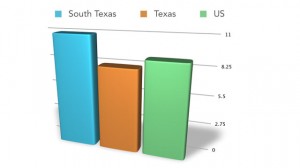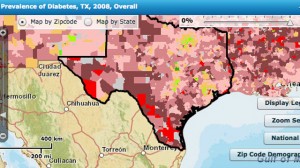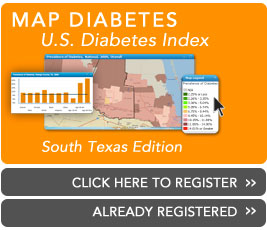Posted by Diabetes South Texas Staff
Clinical Trials
Saturday, October 29th, 2011

October 10, 2011 — Three studies of diabetes disease management programs indicate that intensive behavioral and educational interventions may improve patient outcomes. The 3 studies analyzed different intervention programs in different patient populations, and the results were published online October 10 in the Archives of Internal Medicine as part of the journal’s Health Care Reform series.
One research group, led by Katie Weinger, EdD, from the Joslin Diabetes Center in Boston, Massachusetts, found that a structured, cognitive behavioral program was more effective than 2 control interventions in improving glycemia in adults with long-duration diabetes. The trial randomly assigned 222 adults with diabetes (49% with type 1) to 1 of 3 treatment groups: structured behavioral treatment (included a 5-session manual-based, educator-led structural intervention with cognitive behavioral strategies), group attention control (educator-led attention control group education program), and individual control (unlimited individual nurse and dietician education sessions for 6 months). All groups showed improved HbA1c levels (P< .001). The structured behavioral group, however, showed greater improvement than the group attention and individual control groups (P = .04 for group). This study thus supported educating patients with modified psychological and behavioral strategies.
JoAnn Sperl-Hillen, MD, from HealthPartners Research Foundation and HealthPartners Medical Group in Minneapolis, Minnesota, and colleagues found that individual education resulted in better glucose control outcomes than did group education in patients with established suboptimally controlled diabetes. The study evaluated a total of 623 adults from Minnesota and New Mexico with type 2 diabetes and HbA1c concentrations of 7% or higher. Although mean HbA1c concentrations decreased across all treatment groups, levels decreased significantly more in the individual education group (−0.51%) when compared with the group education using the US Diabetes Conversation Map Program (−0.27%, P= .01) and the usual care (−0.24%, P =.01) groups. Participants in the individual education group were more likely to have HbA1c levels at or below 7% (21.2%) than participants in either the group education (13.9%) or usual care (12.8%) treatment groups (P = .03 for both comparisons) at follow-up 6.8 months after enrollment. Patients receiving individual education also tended toward better psychosocial and behavioral outcomes. Read Full Article
Posted by Diabetes South Texas Staff
Key Facts
Friday, October 28th, 2011

- The prevalence of adult diabetes is more than 20% higher in South Texas – Cameron, Hidalgo, Starr and Willacy counties – than the state of Texas.
- In South Texas, there are almost 70,000 people with adult diabetes, equaling 11 percent of the population.
Posted by Diabetes South Texas Staff
Minority Diabetes Reports
Friday, October 28th, 2011

SAN FRANCISCO–Any cuts to Medicaid pose a danger to African Americans and Latinos, groups disproportionately suffering from high rates of chronic disease and lack of health insurance, according to a study released last week.
According to the report “Medicaid: A Lifeline for Blacks and Latinos with Serious Health Care Needs,” about one in four African Americans and Hispanics with heart disease or who survived a stroke rely on the state- and federally-funded health insurance program for low-income Americans.
For example, of the more than 200,000 blacks with diabetes in California, 32.5 percent are on Medi-Cal (the state’s name for Medicaid), while among the states nearly 80,000 Latinos with diabetes, 28.4 percent are on Medi-Cal.
The report was released by a consortium of organizations, including Families USA, the American Diabetes Association, National Association for the Advancement of Colored People and the National Council of La Raza. It contends that any cuts to Medicaid would have dangerous consequences for the seriously ill people among them.
Cuts Possible From Congress’ “Super Committee”
The report comes as the congressional “super committee” debates ways to reduce the federal debt by $1.5 trillion over the next decade. The committee of 12 powerful members of Congress, half from each party, has been charged with crafting a plan for cuts or tax increases that Congress must vote up or down with no further debate.
Vying for the committee’s approval are Medicaid reduction included in the controversial deficit proposal passed earlier this year by House Republicans. It would have reduced the National Debt partly through sweeping changes to both Medicare and Medicaid. READ FULL ARTICLE
Posted by Diabetes South Texas Staff
Minority Diabetes Reports
Friday, October 28th, 2011

By Mary Agnes Carey – Kaiser Health News: Blacks and Latinos would be among those hardest hit if Medicaid funding were cut as part of a deficit-reduction package, according to a new report released today by Families USA, theNational Association for the Advancement of Colored People and the National Council of La Raza, among others.
In these communities, more than one in four people rely on Medicaid, the shared federal-state health program for the poor, compared with fewer than one in eight whites.
Blacks and Latinos are not only more likely than whites to suffer from chronic diseases such as diabetes, asthma and certain cancers, but they are also more likely to experience complications, to have poorer outcomes and to die prematurely from those conditions, according to the report.
“Without Medicaid, many of these seriously ill people would not be able to afford the care they need. For them, Medicaid coverage is critical. Federal or state cuts to the Medicaid program would truly put them at risk,” the study warns. Read Full Article
Posted by Diabetes South Texas Staff
News
Friday, October 28th, 2011

By Laura Kennedy, Contributing Writer
Research Source: Health Services Research
Health Behavior News Service
- Among patients with diabetes, Latinos and African-Americans are more likely to miss scheduled primary care appointments than Filipinos, Asians or Caucasians, according to a new study.
- Patients who often miss primary care appointments have poorer control of blood sugar, blood pressure and cholesterol levels.
- Providing same-day appointments to increase convenience and access may lead to more missed appointments for chronic disease maintenance, especially for Latinos and African Americans.
Ethnic differences in appointment keeping may be an important factor in poor health outcomes among some minority patients with diabetes, according to a new study.
The researchers reviewed survey data and medical records for nearly 13,000 participants in the NIH-funded Diabetes Study of Northern California (DISTANCE) and found that some minority groups missed scheduled primary care appointments twice as often as others, even after accounting for many health and demographic factors. Latinos and African-Americans had the lowest rates of appointment keeping Asians had the highest, with Filipinos and Caucasians falling in between.
The study also found that patients who often miss appointments were at increased risk for poorer control of blood sugar, cholesterol, and blood pressure. Additionally, the study showed that these groups tended to rely more heavily on same-day visits. This is the first study to evaluate primary care usage in a large, ethnically diverse group of diabetes patients with uniform access to health care. The findings have important implications for health care systems as they increase “open access” to care through same-day appointments, which may not provide the same level of chronic care management as planned visits, even when the appointment is with one’s own primary care provider.
“Providing greater convenience for patients may impact ethnic groups differently and perpetuate disparities in unexpected ways,” says lead author Melissa Parker, M.S., of Kaiser Permanente in California. The study appears in the current issue of Health Services Research. Read Full Article
Posted by Diabetes South Texas Staff
About the Index
Friday, October 28th, 2011

The U.S. Diabetes Index (USDI) provides real-time information about diabetics, their care, and the trends that are shaping the diabetes market in the United States. The USDI is built to be the national index by which diabetes in America is measured. It consists of over 30,000 tables, maps, charts and graphs by market segment (a comprehensive selection of geographies segmented by race/ethnicity, age and gender) for the years 2000-2009. Additional years will be added as the underlying data becomes available.
The USDI is a comprehensive online tool that reports on the prevalence of prediabetes; prevalence of diabetes; the cost of the epidemic; clinical information about diabetics (such as aggregated HbA1c, eGFR, hypertensive, BMI, etc); the attitudes and opinions that are shaping how diabetics are coping with their disease; location of diabetes clinicians; and how variations in the utilization of diabetic products and services are impacting outcomes and costs – national, region, state, county, MSA, zip code, and congressional and state legislative districts, further segmented by race/ethnicity, age and gender, for the years 2000-2009. To inquire about an annual subscription, please contact Gary Puckrein at gpuckrein@nmqf.org or 845-371-7201.
USDI South Texas Edition
The South Texas edition of the USDI is available directly from this website without a subscription. It is a comprehensive online tool that reports on the prevalence of diabetes and the total number of people living with diabetes within the South Texas (Cameron, Hidalgo, Starr and Willacy counties), segmented by race/ethnicity, age and gender, for the years 2000-2009.
Click here to Register
Already Registered Click Here
Posted by Diabetes South Texas Staff
The Initiative
Friday, October 28th, 2011

The South Texas Diabetes Initiative is a community-driven effort to improve patient health outcomes and lower costs for the entire health system through appropriate diabetes management in South Texas (Cameron, Hidalgo, Starr and Willacy counties). This network of healthcare professionals, business leaders, government officials and patients are dedicated to finding solutions to today’s complex diabetes problems in the South Texas community.
Why South Texas?
- The prevalence of adult diabetes is more than 20 percent higher in South Texas than the entire state of Texas – close to 70,000 people have adult diabetes.
- More than one quarter of all people with diabetes in South Texas have uncontrolled diabetes (25.1 percent, as defined by hemoglobin A1C levels greater than 8).
- A greater percentage of adult diabetics visit the ER or hospital than the national average.
- Individuals in South Texas are uninsured at a rate more than double the national average, and more than 25 percent of the diabetic population in South Texas is uninsured.
Through community-wide collaboration, our aim is to help improve health outcomes and decrease hospitalizations rates in South Texas.
Our Approach
We started from the ground up by talking with community members and healthcare leaders in South Texas to understand the barriers to appropriate diabetes care and management. Based on these conversations, the South Texas Diabetes Initiative is working to develop a plan that will:
- Address cultural considerations that influence adoption of appropriate diabetes care
- Include community-based interventions that have been evaluated and proven successful in other markets
- Help physicians and other healthcare providers make necessary changes to their practice structure to facilitate better diabetes care and patient adherence
- Help increase overall awareness of appropriate diabetes care among the patient population in South Texas
We’ve also created a centralized data resource for South Texas, which provides the most recent, comprehensive, localized diabetes prevalence and cost data. This tool has helped us to pinpoint the changes that we believe will make the greatest impact in South Texas, and will also help measure the overall success of the Initiative moving forward.
Community Partners Committed to Making a Difference
The South Texas Diabetes Initiative is built upon community-wide involvement and the commitment of all stakeholders to take action and make a difference. The success of the program relies on the dedication of South Texas’s patients, caregivers, healthcare providers, community officials and local business leaders to make a difference. The effort in South Texas is currently led by the following organizations:
- Doctors Hospital at Renaissance, a state-of the-art hospital in South Texas dedicated to the provision of quality, compassionate and cost-effective patient care. Doctors Hospital proudly offers premier diabetes services through its branch of the Joslin Diabetes Center, the world’s preeminent diabetes research and clinical care organization.
- The University of Texas-Pan American, a Hispanic serving institution located in Edinburg, TX, provides program specific classes at various campus locations and through their online learning center. The university recently received a $6 million diabetes research grant to explore options for improving the state of diabetes in South Texas and beyond.
- The Diabetes Care Project (DCP) is a coalition of patient advocates and health partners whose goal is to educate patients, caregivers, healthcare providers and policymakers on the value of developing personalized management plans for diabetes patients in an effort to improve each patient’s health outcomes and lower costs for the entire health system. Roche Diagnostics and the National Minority Quality Forum are founding partners of the Diabetes Care Project (DCP). All partners of the DCP are committed to improving patient outcomes and advancing diabetes care and management. For more information please visit www.diabetescareproject.org.
If you are interested in becoming part of the South Texas Diabetes Initiative, please send an email to info@diabetescareproject.org.


































